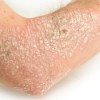Using emollients to increase absorption of UV light in psoriasis
 Various topical emollients can affect the penetration of ultraviolet (UV) radiation during phototherapy of psoriasis.
Various topical emollients can affect the penetration of ultraviolet (UV) radiation during phototherapy of psoriasis.
Researchers at the University of Arizona, in Tucson, reviewed the evidence.
Here’s what we know.
Studies have tested the effect of emollients on light penetration by assessing psoriatic plaque clearance, differences in minimal erythema dose, and physical properties of the emollient (eg, monochromatic protection factor and absorbance).
Compared with normal-appearing skin with a reflectance of 4% to 5%, psoriatic skin has higher reflectance as a result of its increased air-to-corneocyte (outermost part of the epidermis) interfaces.
- Psoriatic plaque clearance improves with serous (thin liquid)-based emollients.
- Vaseline oil (Unilever)
- Mineral oil
- Glycerol
- Clearance decreases with…
- Salicylic acid
- Viscous-based emollients (eg, petrolatum)
- Emollients with high UV absorbance properties increased minimal erythema dose.
- Those with low absorbance properties decreased minimal erythema dose.
Interestingly, when a liquid emollient with a refractive index close to that of normal-appearing skin was applied, there was a net increase in light absorption, or a reduction in reflection that exceeded the emollient’s innate ability to absorb light.
The bottom line?
The University of Maryland website tells us, “Some evidence suggests that using a simple emollient (such as Vaseline or mineral oil) that enhances UVB light penetration can be effective.”
This addition to the treatment increases the risk for sunburns, and patients must avoid sun exposure.
Patients should make their healthcare providers aware of their use of emollients under these conditions. They should also record the response to this practice over time.
2/18/13 13:20 JR